I grew up in the monoculture wasteland of Iowa, surrounded by endless fields of corn and confined animal feeding operations. My family didn’t farm, my friend’s families didn’t farm, and I knew very little of what it meant to grow food or raise animals. When I moved to Viroqua, Wisconsin to attend Youth Initiative High School, I began to learn how to grow food and I felt like I finally understood the beauty of what it meant to be from the rural Midwest. Below are a few of the many reasons I love to farm, as discovered through my experiences farming across the United States in the last 8 years.
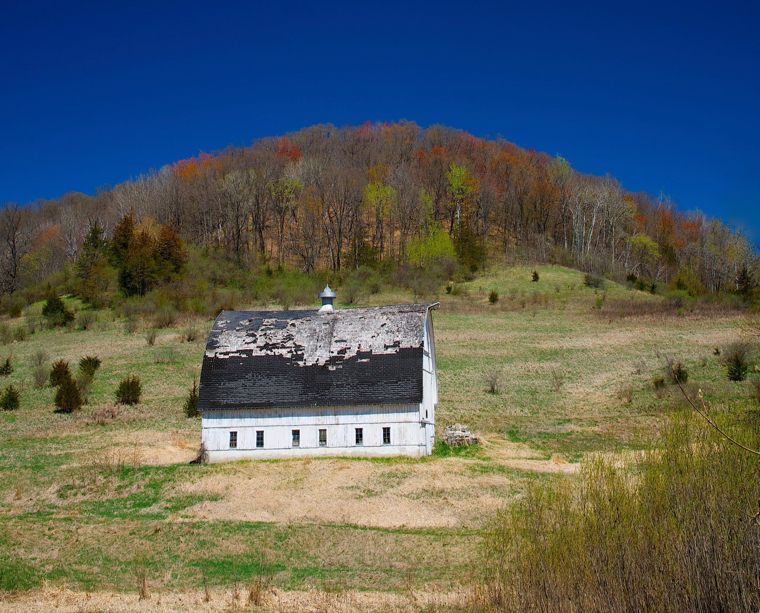
photo courtesy of Drew Shonka
To farm is to teach myself to notice. To carefully observe the weather. To see the unique curvature of each pepper or squash. To watch raspberries get plump after it rains. To see a yellow and black orca spider for the first time as I cleared a lettuce bed at Green Earth Gardens in Unity Maine. I remember a soil workshop at Youth Initiative High School where a farmer came in and dumped two different buckets of soil on the table and our class had to describe the qualities of each. One was from a monoculture cornfield, one was from an organic farm. One was rocky, dense, dry, and light in color. The other was moist, aerated, and a deep rich brown.

To farm is to embody my physical strength and utility as a human being and as a woman. To be a woman is to feel the need to constantly prove my strength, and to carry the heavy fruits of my labor on farms is to embody and build strength in each harvest. I remember working with Zach, Ethan, and Brian Wickert at EZ farms and gaining the nickname “the boss.” Thinking back on this nickname I am able to remind myself of my first experiences of feeling strong and powerful. And there is nothing more flattering than being compared to Bruce Springsteen.

To farm is to honor the land and every indigenous culture that has developed our methods of growing food. To love potatoes is to love the Incan cultures of Bolivia and Peru that cultivated the potato 10,000 years ago. The fresh potato salad I made with 5 varieties of potatoes harvested from Amba farms that summer in New York is connected to countless people and traditions whose told or untold stories remain alive in the potato.
To farm is to give the gift of growth. I have watched teenagers, with whom I worked at Tamarack Farm in Vermont, go from despising the toil of weeding to returning to the farm the following summer and actively sharing the beauty and joy of growing vegetables to our new campers. They grew food as they grew themselves. They turned resentment into tomatoes, angst into beans, frustration into flowers. As a teenager I grew a work ethic and an appreciation of the land when I began learning to farm.
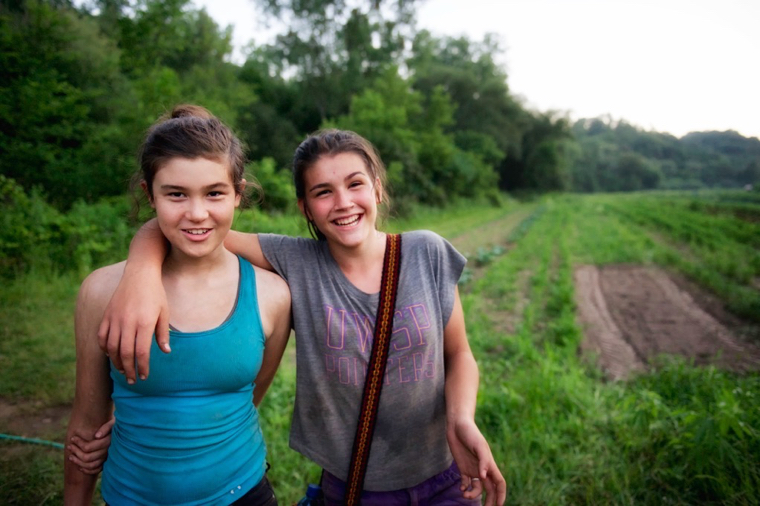
photo courtesy of Richard Bock
To farm is to reclaim what it means to be rich. I once worked on a farm owned by a financially wealthy woman in Westchester county New York. I lived with her in her giant house full of fancy rugs, paintings, marble floors, and a pool. She did very little of the work out on the farm but basked in the glory her farming identity, receiving credit from her community and even reporters who came to document her story as a woman who left New York City and started a farm. Yet the success of her farm was built on the backs of a young couple, three Guatemalan men, and myself, and I am convinced we were living a richer life. The vegetables we grilled after a long day of work in the sun tasted better because of the work we put in to grow them, and the community we built together as workers on the farm. I am convinced that anyone who farms with humility and honors the natural cycles of the land is living more richly than kings and queens.
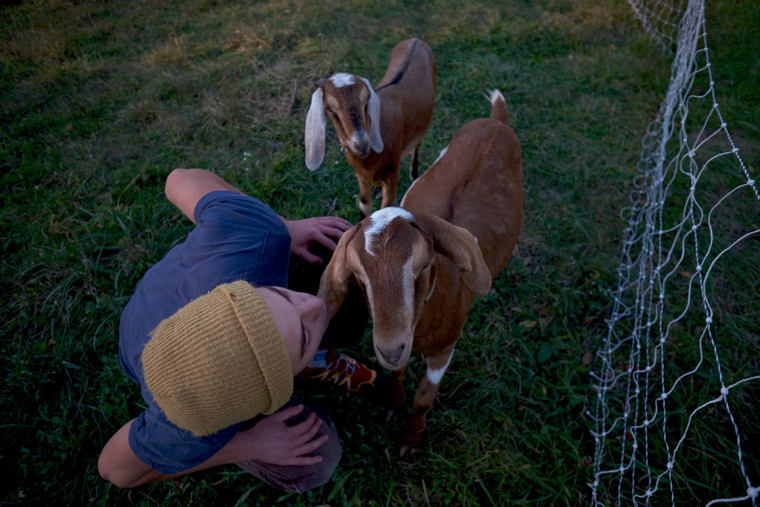
To farm is an act of hope and resistance in dire times. Climate change tells us our farms are at higher risk of washing away, drying up, being plagued by diseases or pests, or that someone will try and build a pipeline beneath them. Yet we farm anyway. We farm because we believe in caring for the land and providing for each other. And to give up doing that is to give up hope.
To farm is to love the struggle. I remember hoeing squash fields for 7 hours straight, 3 days in a row in the hot Wisconsin summer heat. I’m convinced my back holds the most vivid memories of those days. I remember spending a week, piled with all the long underwear and coats I owned, harvesting brussel sprouts in Maine in the cold month of November. I remember staying up all night working on endless college assignments, only to drag myself out of bed early to tend to the plants and chicken at the Warren Wilson College Garden the next morning. To struggle growing food is to work for something bigger than the pleasure of our own experiences.
To farm is to be introduced to the most humble and wonderful people. To people who notice, to people who are strong, to people who preserve cultural traditions, to people who are rich with life, to people who hold hope and resistance, and to people who love the struggle.
The essence of each of these experiences is roots. Farming is the act of rooting myself where I am. From Iowa to Wisconsin to North Carolina to Vermont to Maine; I grew roots in those places because I grew the roots of plants in the ground. I learned to see the exquisite qualities of each place through having my hands in the soil. Like a dandelion seed that is whisked through the air, I fly, and then I land and take root.
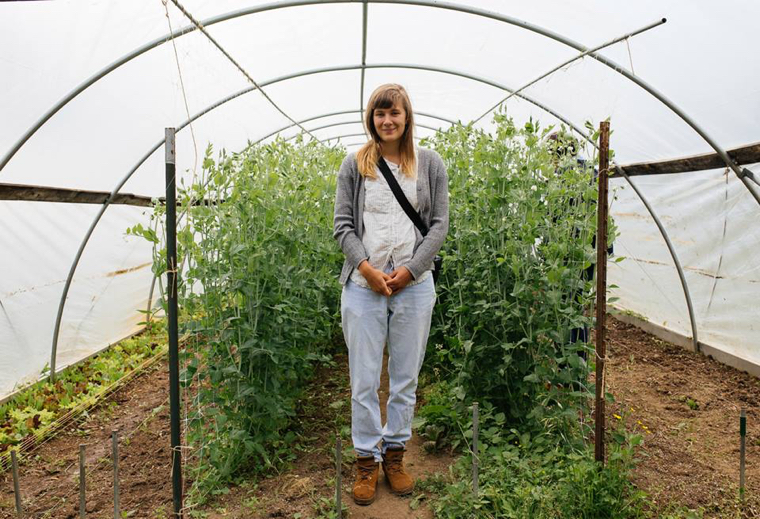
Talia Winningham in the greenhouse at Warren Wilson College

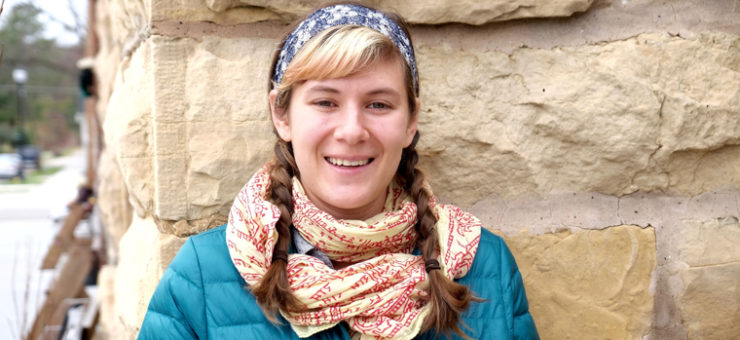





This is the most beautiful writing in style and message. Reminds me of Wendell Berry in its poetry and imagery. Thank you, Talia; and thanks for posting this so we can share it!
This is a young woman who truly understands the kind of awareness, connection, will and enduring care of our Mother Earth that is called for in our times. May she inspire many other young people to follow her way!
After 21 years of farming, I still needed to read and re-read these words. If I forget them in the future, please remind me.
Thank you!
Very earthy account of your experience and growth – so inspiring!
A lovely, personal, vivid description of a rich life!
Sincerity at its best – an example to all inspiring to join the agrarian world view and life affirmation through stewardship and growing food. Thank you Talia.